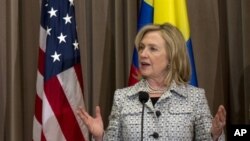President Barack Obama has sent two White House officials to Sudan, the Middle East, and Afghanistan to discuss threats posed to the Comprehensive Peace Agreement by recent violence, the situation in Yemen and transition in Afghanistan.
White House statements provided some details on the travels of two key Obama advisers as the president closely monitors the precarious situation in Yemen, and watches developments in Sudan after the outbreak of fighting in the oil-rich Abyei region.
At Mr. Obama's request, counter-terrorism advisor John Brennan traveled to Sudan, Saudi Arabia and the United Arab Emirates.
In Khartoum, Brennan joined U.S. Special Envoy Princeton Lyman in talks with Sudanese government officials to discuss implementation of the Comprehensive Peace Agreement.
According to the White House statement, Brennan underscored President Obama's "deep concern" over the continued presence of Sudanese northern forces in Abyei, and urged a "rapid and peaceful resolution to the crisis" and to resolving outstanding issues under the North-South peace agreement signed in 2005.
The Obama administration has been holding off moving forward with a key bilateral aspect linked to implementation of the Sudan peace agreement, namely the removal of Sudan from the U.S. State Sponsors of Terrorism list.
Wednesday's statement said Brennan discussed the status of the "ongoing review" of this issue and what it called the "importance of counter-terrorism cooperation against al-Qaida and affiliated groups.
The White House said special envoy Lyman would remain in the region to work with the African Union, United Nations and the parties to "urgently address the crisis."
U.S. concerns about the deteriorating situation in Yemen and options to address it are the subject of Brennan's visits to Saudi Arabia and the United Arab Emirates.
The White House strongly condemned recent clashes in Sana'a and the "deplorable use of violence by the government against peaceful demonstrators in Taiz," saying these underscore the need for President Saleh to sign the agreement brokered by the Gulf Cooperation Council.
At the State Department Wednesday, Secretary of State Hillary Clinton reiterated the U.S. call for President Saleh to step aside.
"If it wasn't obvious before, it certainly should be now that his presence remains a source of great conflict and unfortunately as we have watched over the last several days, even military action and violence," said Secretary Clinton.
A month before the scheduled start of a U.S. troop draw down in Afghanistan, the White House also announced that Deputy National Security Advisor Denis McDonough traveled to Afghanistan, and to Uzbekistan at the end of last month.
In Kabul, McDonough met with U.S. and international civilian and military officials and what the White House statement called key Afghan counterparts. The White House says he did not meet with President Hamid Karzai. The Afghan leader sharply criticized recent NATO airstrikes in southern Helmand province that caused civilian casualties.
The White House said McDonough also visited locations in regional commands in the north, east and south of the country, and exchanged views about how the United States and its partners "can best support the transition and Afghanistan’s economic future."
In Uzbekistan, which is critical to U.S. operations in Afghanistan, McDonough's discussions in Tashkent with President Islam Karimov focused on what the White House called a "wide range of issues of mutual concern" with McDonough thanking the Uzbek leader for Uzbekistan’s "ongoing support, including reconstruction efforts in Afghanistan."
US Officials' Travel Focuses on Sudan, Yemen, Afghanistan
- By Dan Robinson





